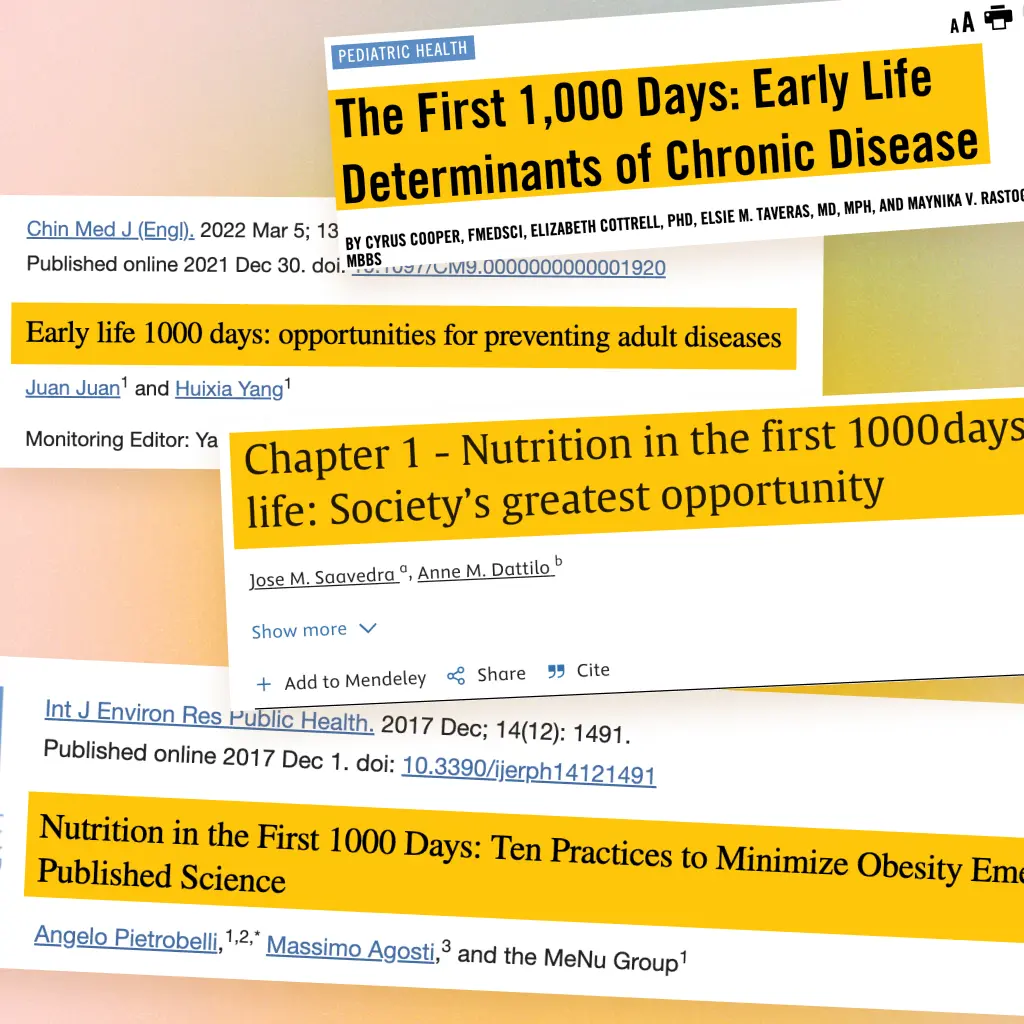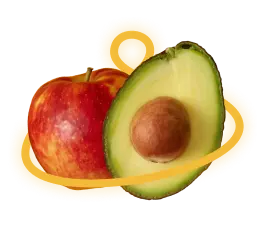6+ months





- 🫑 Nutrient-dense to meet rising iron needs
- 🐣 Supports brain, eye, and immune development
- ➕ Smooth textures for easier transition to solids
- 🥣 Naturally rich in prebiotics for healthy digestion
Developed by leading European baby-nutrition experts
Formulated for the critical first 1,000 days that shape lifelong health
Locks in nutrients most baby foods lose during processing
And get 10% OFF on your first order

Nutrition in the first 1000 days of life can help prevent chronic diseases as we grow, a fact backed by
These include:Our team of clinical infant dietitian, a paediatrician and two nutritionists have developed recipes grounded in “the First 1000 days” scientific principle - to give humans the best possible start from the beginning.
Most conventional baby food loses valuable nutrients during high-heat processing.
We use advanced freeze-drying technology — originally developed by NASA — that locks nutrients in while keeping the natural taste, texture, and colour of real food.
Our recipes are designed to include a specific wide range of flavours and textures. These are the two main elements that impact healthy eating habits from the start.

Developed based on scientific studies

Store in your car or cupboard, prepare anywhere

No added sugar or other additives

100% organic ingredients
Frozen Baby Food
Fresh Baby Food
Jarred & Pouches
Shelf-stable, no fridge required
Nutrients stay locked in
Tastes like fresh, because it is
Ready in 1 minute

Lightweight, portable, and fridge-free. Ready in 60 seconds:
Mix with water, breast milk, or formula
Stir for 30 seconds
Feed your baby
Join the waitlist 👉We know our approach to baby food is radically different but that’s exactly why we love explaining it. Discover the science behind Foodle and why nutrition in the first 1,000 days is so important for lifelong health.
We’ve experienced incredible interest for Foodle. Thank you for the enthusiasm and patience.
Because we use only the highest-quality organic ingredients and maintain rigorous testing standards, each batch of Foodle takes time to produce, and it’s challenging to scale this type of production.
We’re now in the final stages of making Foodle available to everyone.
Join the waitlist to be notified as soon as we’re in stock and enjoy an exclusive early-bird discount on your first order as a thank you for waiting.
Everything we do is guided by real, peer-reviewed science.
Our team of experts, including a paediatrician and a clinical infant dietitian, combine medical insight with nutritional science to design recipes built on the principles of early-life nutrition.
This approach, known as nutritional programming, recognises that what babies eat in their first 1,000 days helps shape their lifelong health.
Foodle also brings you unmatched convenience: no refrigeration, no thawing: just a minute to prepare a meal that’s packed with nutrients, taste, and texture.
And because our freeze-drying process protects heat-sensitive nutrients, your baby gets the goodness of real food in every spoonful.
Nutrition plays a vital role in preventing chronic diseases later in life, and the scientific evidence supporting this is extensive. Numerous studies have highlighted the long-term health impact of early nutrition and its influence on disease prevention.
Here are some key points:
Scientific research indicates that nutrition during the early stages of life, particularly the first 1000 days, has a profound impact on long-term health outcomes. Proper nutrition during this critical period can help establish a strong foundation for optimal growth, development, and overall well-being.
The concept of nutritional programming suggests that the food we consume during early life can "program" certain physiological and metabolic processes that persist into adulthood. This programming can affect the risk of developing chronic diseases such as obesity, diabetes, cardiovascular diseases, and even certain types of cancers.
Studies emphasise the importance of a well-balanced diet that provides the appropriate ratios of essential nutrients, including carbohydrates, proteins, fats, vitamins, and minerals. Adequate intake of these nutrients during the early years helps support healthy growth, immune function, cognitive development, and the prevention of chronic diseases.
Research has shown that intervening early in life with nutritionally sound approaches can have significant positive effects on long-term health outcomes. By providing optimal nutrition during the critical window of early development, we can potentially reduce the risk of chronic diseases and improve overall health trajectories.
The scientific community extensively examines the link between nutrition and chronic disease prevention. Peer-reviewed studies, conducted by experts in the field, contribute to our understanding of the complex relationship between nutrition and long-term health outcomes. These studies provide evidence-based insights that inform the development of nutritional strategies aimed at reducing the risk of chronic diseases.
At Foodle, we are committed to evidence-based nutrition programming and rely on the latest peer-reviewed research to inform our product development. We prioritize the inclusion of essential nutrients in optimal proportions to support lifelong health and reduce the risk of chronic diseases. Our goal is to provide scientifically backed nutrition that sets the foundation for a healthy future.
To prepare Foodle, simply mix it with the recommended quantity of hot or cold water, breast milk, or formula. You have the freedom to adjust the amount of liquid according to your preference. Give it a good stir for about 20 seconds, and you're good to go!
Our products can be stored at any temperature, but we recommend keeping them in a cool, dry place. Once you've opened the package, it's best to finish it within 24 hours to maintain its freshness.